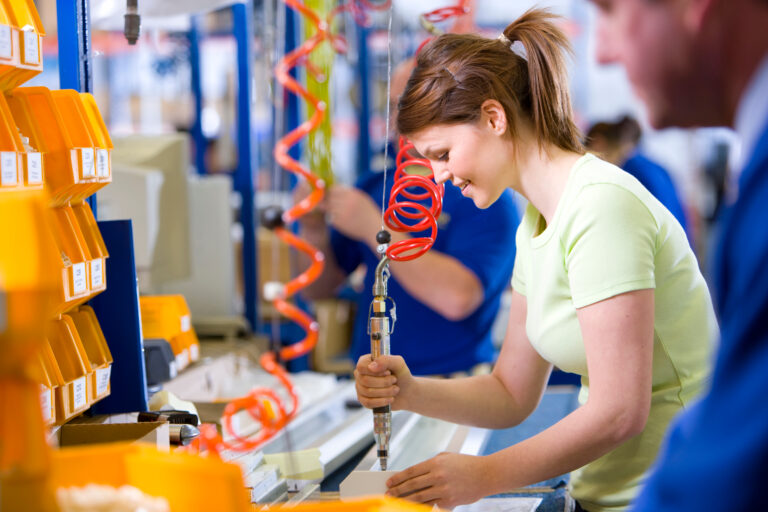One of the most important decisions a person makes is where to work. But, with so many potential job options available, choosing a path can be overwhelming. There are also several factors to consider to ensure that the position will be personally, professionally, and financially satisfying.
For anyone looking for work that can fulfill all of those needs, there has never been a better time to work in manufacturing, and technology is helping pave the way.
Opportunities For Growth in the Manufacturing Industry
There are enormous opportunities in manufacturing, both for getting a job and for advancement within the company. With more than 11 million workers, manufacturing consistently ranks as one of the top five largest employers in the US. These numbers might make it seem like there aren’t many positions available for new workers, but the opposite is true.
Despite the abundant workforce, studies show that 2.1 million manufacturing jobs could go unfilled by 2030. This is a costly risk for businesses, but it’s a great opportunity for prospective employees.
The manufacturing industry in the United States has approximately 700,000 open jobs. Once hired, there ample opportunity for upward mobility and a chance to develop a unique set of skills. These people will then find themselves in high demand, thanks in part to the skills crisis. Many businesses have begun assisting with training by partnering with agencies and technical colleges to offer apprenticeship programs, certifications, and two-year degrees.
Emerging Technologies for Manufacturers
Emerging technologies like robotics, AI, and 3D printing are changing the landscape of manufacturing, and while it might seem like they could reduce traditional manufacturing jobs, they have the potential to create new opportunities and roles within the industry. Here’s how these technologies can contribute to the creation of manufacturing jobs:
Robotics:
- Design and Maintenance of Robotics: As more companies adopt robotic systems in their manufacturing processes, there’s a growing need for professionals who can design, program, install, and maintain these robots. This includes robotics engineers, technicians, and software developers.
- Integration Specialists: Manufacturing facilities require experts who can integrate different automation technologies, ensuring that they work together smoothly and efficiently.
- Data Analysts: Automation generates a wealth of data, and data analysts are needed to interpret this data and make informed decisions for process optimization and improvements.
3D Printing:
- Design and Modeling Specialists: With 3D printing, the design phase becomes critical. Designers skilled in creating 3D models can find opportunities in various industries, from aerospace to consumer goods.
- Materials Scientists: Developing new materials suitable for 3D printing is an ongoing need. Experts in materials science can create innovative materials that expand the possibilities of additive manufacturing.
- Post-Processing and Finishing Roles: While 3D printing creates components, there’s often a need for post-processing, finishing, and assembly. Skilled workers are required to ensure the final product meets quality standards.
AI & Machine Learning:
- AI Engineers and Developers: Manufacturing companies need AI experts who can create and implement AI algorithms to enhance quality control, predictive maintenance, and process optimization.
- Machine Learning Specialists: AI and machine learning play a role in making manufacturing systems more adaptable and efficient. Specialists in machine learning can develop models to improve production processes and reduce waste.
- Process Optimization: Manufacturing process engineers work with machine learning experts to develop algorithms that optimize production processes, reduce waste, and improve overall productivity.
It’s important to note that while these technologies can create new job opportunities, they also require a skilled workforce. As manufacturing becomes more technologically advanced, there will be a growing demand for individuals with expertise in these fields. Education and training programs that focus on these emerging technologies will be crucial in preparing the workforce for the changing landscape of manufacturing.

The Importance of Flexible Scheduling
When trying to balance work and family, scheduling is key. Unlike some industries such as retail and food service where shifts regularly change from week to week, manufacturing shifts are typically set and predictable. This allows employees to plan, make medical appointments, and arrange for childcare – take care of their personal lives
However, the fact that schedules are set does not mean that they can’t be flexible. Options for more flexible scheduling have increasingly taken hold as a priority, and companies have realized that it leads to more productive, happier employees.
Possibilities for flexibility in scheduling include:
- Flexible start times
- Shift swapping
- Compressed or short weeks
- Task-oriented scheduling
- Staggered work shifts
Safety and Compliance for Manufacturing Jobs
In the past, manufacturing jobs were considered dangerous and high-risk, but this is not the case in the current environment. Safety has become paramount, standards are high, and violations can lead to costly penalties. It is in the company’s best interest to keep employees safe, not only to maintain productivity but also to avoid investigations and potential fines.
Workforce management software is playing a significant role in increasing safety and compliance in the manufacturing industry. Here’s how this technology is contributing to improved safety and adherence to regulations.
1. Shift Planning and Scheduling
Workforce management software helps optimize shift planning and scheduling to prevent employee fatigue, which can lead to accidents. By ensuring that employees have adequate rest between shifts, the risk of errors and accidents due to tiredness is reduced.
2. Training and Certification Tracking
The software can track employee training and certifications related to safety procedures and compliance requirements. This ensures that employees are adequately trained and certified to operate specific equipment or perform certain tasks, minimizing the risk of accidents caused by a lack of knowledge.
3. Auditing and Documentation
Workforce management software enables accurate and automated record-keeping. This documentation is crucial for compliance with safety regulations. It also provides a trail of actions taken in response to safety incidents, which can be valuable during audits.
4. Task Management and Prioritization
The software can help prioritize tasks and allocate resources based on safety considerations. High-risk tasks can be managed more effectively, ensuring that appropriate precautions are taken.
Embrace Innovation With a Manufacturing Job
The final reason to seek a job in manufacturing is the kind of work that is involved. There are positions available in a wide range of industries. Whether someone is passionate about cutting-edge technology, sustainable practices, innovative product design, or precision engineering, the diverse landscape of manufacturing offers opportunities to align one’s career with their interests and values.
Furthermore, manufacturing leads to tangible, visible outcomes that can significantly enhance a person’s career satisfaction. Given the central role of innovation in manufacturing, the daily tasks undertaken serve as vital building blocks for the future. Each day’s contributions become integral pieces in the puzzle of progress, making the work not only fulfilling but also empowering as it actively shapes the trajectory of industries and technologies.
Indeavor’s Manufacturing Workforce Solutions
Indeavor’s shift schedule and labor analytics solution provide critical insights for ultimate workforce optimization in manufacturing. Boost productivity, save time, and streamline workflows. Indeavor aims to boost employee engagement and drive flexibility through schedule autonomy from anywhere. Allowing employees to focus on what matters most.
About the Author
Claire Pieper is the Marketing Communications Coordinator for Indeavor. She aims to share information to improve the customer journey. To learn more or get in touch, connect with Claire on LinkedIn.







